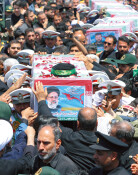NK`s `Slavery Labor` Brings about Controversies on International Law Violation
NK`s `Slavery Labor` Brings about Controversies on International Law Violation
Posted August. 08, 2001 09:59,
According to the report of the Yomiuri in Japan, North Korea pays back about 90 percent of its debt by labor power mobilizing over 4000 people.
The newspaper explained that the NK`s repayment by the labor power had been indicated for a long time but the detailed ratio revealed for the first time illustrating the serious condition of the North Korean economy.
Russia exported 54.6 million dollars to the North last year and imported 50.4 million dollars from North Korea. According to the Russian authority, 90 percent of the import was the `labor power` of the North. The Russian official said, ``The settlement by the labor power are based on the agreement with the North.`` But he did not mention when the settlement method was introduced and how they exchange the labor power with the debt.
The public announcement of the fact seems to be driven by the policy of Russia President Vladimir Putin to give priority to the economy even with the friendly countries and by the newly introduced auditing system of the international standard.
Amnesty International estimated the number of the North Korean laborers who had worked in Russia last year as many as 4000 people. They primarily worked in the Far East area and Siberia for the farming, lumbering, and construction. The Siberian area has suffered the reduction of the population recently and the increase of the labor fees and the transportation fares. Thus, the North Korean laborers are mobilized to help with the lumbering, mining, and constructions that had been hindered by the increase cost.
According to the Amnesty International, North Korea began its labor mobilization to Russia in 1967 and established a deforestation agreement with Russia in 1995, which regulates the repayment of the NK`s debt based on the labor fee and the total work completed. However, since the labor environment is bad enough to be considered as forced labor, many workers have run away.
International human rights organizations indicated the possibility that the NK`s repayment by labor power may violates the international law that prohibits the forced labor. In addition, if Russia deploys the police for the surveillance over the laborers, which also violates the international law, the international controversies may be anticipated.
Shim Kyu-Sun ksshim@donga.com







